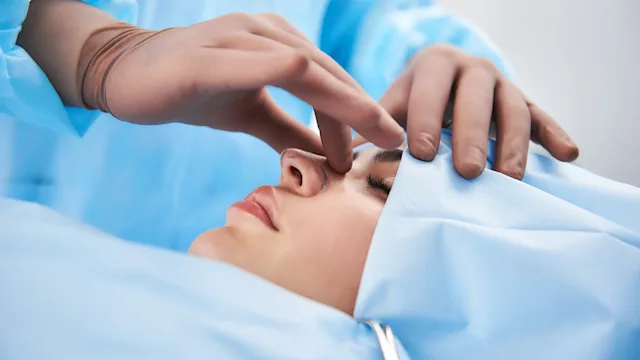Key takeaways:
Melatonin supplements are natural remedies that can help treat insomnia and jet lag. They’re available over the counter without a prescription.
Melatonin sprays are a new form of melatonin supplements. They work by being quickly absorbed through the blood vessels lining the nose or mouth.
Melatonin sprays work just as well as melatonin tablets, pills, and gummies. But be sure to follow dosing instructions to make sure you don’t accidentally take too much.
Save on related medications
Everyone has trouble falling asleep from time to time. You can improve sleep quality with changes to your bedtime routine and with natural sleep supplements, like melatonin.
Many people turn to melatonin supplements to help them overcome short-term sleep issues. The most popular forms of melatonin supplements are gummies, tablets, and patches. And now melatonin is available in spray form too. But do melatonin sprays really work?
Let’s look at how melatonin spray works and the best way to use it to help you fall asleep.
Search and compare options
What are melatonin sprays?
Melatonin is a hormone made by the pineal gland, which is part of the brain. Melatonin helps regulate your circadian rhythm, the brain’s 24-hour clock that controls your sleep cycle.
Melatonin naturally increases when there’s less light. This means your body makes more melatonin closer to bedtime. That helps you get to sleep.
Most people make enough melatonin on their own. But extra melatonin can be helpful when you’re having short-term sleeping issues, like recovering from jet lag. Melatonin supplements help give your body that needed melatonin boost. Most of the time, melatonin supplements are meant to be used for a short period of time to help you regain your natural sleep cycle.
Melatonin supplements come in a variety of forms, including melatonin sprays. Melatonin sprays come in two forms:
Sublingual, which you spray under your tongue
Intranasal, which you spray in your nose
Melatonin sprays contain melatonin that’s made through biomanufacturing. The sprays also contain:
A liquid base made of purified water and glycerin
A propellant that allows a fine spray to be produced when the bottle is pumped
Liposomes, which surround the melatonin in fat bubbles (this helps your body absorb melatonin)
Flavorings or extracts to improve the smell or taste of melatonin sprays
Melatonin can cause side effects. Here are the most common melatonin side effects to know.
Can you take melatonin every day? Our pharmacy experts review how long you can take melatonin and when it’s time to seek help for sleep issues.
Melatonin isn’t a safe choice for everyone. Here’s why you shouldn’t take melatonin if you’re pregnant.
Some melatonin sprays also contain other substances or supplements that may promote better sleep, like CBD.
The FDA doesn’t regulate melatonin sprays. So there’s no way to know precisely how much melatonin might be in a particular product.
Buying a supplement marked USP-verified (United States Pharmacopeia) can help guarantee a more accurate dose.
Read more like this
Explore these related articles, suggested for readers like you.
And you should always check with your primary care provider before taking any supplement to ensure it’s safe for you to use. That’s especially true if you take other medications or supplements, since melatonin can interact with several medications.
How do melatonin sprays work?
Melatonin sprays work by delivering melatonin directly into your bloodstream. The melatonin gets absorbed by the blood vessels under the tongue or inside the nose. This allows melatonin to enter your bloodstream quickly and efficiently.
On the other hand, when you take melatonin as a tablet or gummy, the supplement has to first pass through the gut and liver. This can lower the amount of melatonin that makes it into your system. So, a spray might let you take a lower dose and still get the same effects as you would with a higher dose of melatonin pills.
Plus, it takes longer for your body to break down melatonin in pill or gummy form. Melatonin sprays will reach peak concentrations in the body in as little as 10 to 20 minutes. Meanwhile, melatonin pills and gummies take at least 40 minutes to reach maximum levels in the body. So melatonin sprays start to work faster.
Are melatonin sprays as effective as other forms of melatonin?
Yes, melatonin sprays work as well as other melatonin supplements. One study comparing different melatonin forms found that they all improved the participant’s sleep in one or more ways.
Melatonin sprays may be more effective than melatonin tablets when it comes to treating two sleep conditions:
Transient nocturnal awakenings
Researchers believe this is because melatonin sprays deliver melatonin into your body in a faster and more efficient way.
What’s the dose for melatonin sprays?
Experts are still debating the exact dose of melatonin supplements that’s best for everyone. Most adults need between 3 mg and 5 mg each day. Experts don’t recommend taking more than 10 mg of melatonin at a time.
You’ll need to read the dosing instructions on your product. Different melatonin sprays deliver different amounts of melatonin per pump. Most sprays deliver 0.5 mg to 1 mg of melatonin per spray.
But keep in mind that your body will absorb more melatonin from sprays than from oral tablets. So, if you’re switching to sprays, try a lower dose than you would typically take by mouth. You can slowly increase your dose, if needed.
If you’re new to melatonin supplements, start with 1 mg to 2 mg of melatonin in spray form. You can add more if needed.
As we discussed above, your body absorbs melatonin from sprays faster than from tablets. So, you only need to take your sprayable 20 minutes before bedtime.
Who should not use melatonin sprays?
Melatonin is generally safe for short-term use. But it’s not safe for everyone. You should avoid melatonin sprays if you:
Are pregnant or nursing
Have a seizure disorder
Take medications that have a sedating effect
Have dementia
There isn’t a lot of research on whether melatonin nasal sprays are safe for people who:
Have chronic sinus conditions
Have had procedures on their noses or sinuses
It’s also not clear if melatonin nasal sprays work as well when you have a cold, allergies, or a sinus infection.
You can talk with your healthcare team to determine if melatonin nasal sprays are right for you. You may be able to use sublingual sprays (applied under the tongue) if you can’t use nasal sprays.
Is melatonin spray safe for kids?
Melatonin supplements, including sprays, can be safe for kids. But it’s important to make sure the melatonin is used for the right reason, at the correct dose, and for short periods of time. Melatonin is used to treat specific sleep disorders in children, such as:
Sleep-onset insomnia
Delayed sleep phase syndrome
Insomnia due to stimulant medications taken for attention-deficit hyperactivity disorder (ADHD)
Sleep difficulties in neurodivergent children
But little research has been done on the safety of melatonin sprays in children. Until more information is available, it might be better to stick with oral supplements for kids. Talk with your child’s healthcare team about whether melatonin sprays are safe for your child.
What should you do if you accidentally inhale melatonin spray?
Most melatonin sprays have less than 2 mg of melatonin per spray. So the good news is that taking an extra pump or two by accident won’t cause you harm.
But it’s possible to overdose on melatonin spray. Kids may do this by accident if they play with the product. Contact Poison Control at 1-800-222-1222 if you or a loved one took too much melatonin.
The bottom line
Melatonin in sprays is absorbed faster and more efficiently than melatonin in pills and gummies. Melatonin sprays can help you fall asleep and overcome short-term sleep issues like jet lag. Not all products contain the same amount of melatonin per spray. Make sure to read all the labels so you know how much melatonin your product delivers with each pump.

Why trust our experts?



References
Abdellah, S. A., et al. (2023). Bioavailability of melatonin after administration of an oral prolonged-release tablet and an immediate-release sublingual spray in healthy male volunteers. Drugs in R&D.
Bartoli, A. N., et al. (2012). Bioavailability of a new oral spray melatonin emulsion compared with a standard oral formulation in healthy volunteers. Journal of Bioequivalence & Bioavailability.
Erland, L. A. E., et al. (2017). Melatonin natural health products and supplements: Presence of serotonin and significant variability of melatonin content. Journal of Clinical Sleep Medicine.
Medina, J. (2022). What the heck is melatonin spray – and is it safe for kids? Sleepopolis.
Moroni, I., et al. (2021). Pharmacokinetics of exogenous melatonin in relation to formulation, and effects on sleep: A systematic review. Sleep Medicine Reviews.
National Center for Complementary and Integrative Health. (2024). Melatonin: What you need to know. National Institute of Health.
Onnit. (n.d.). Melatonin spray.
Poza, J. J., et al. (2022). Melatonin in sleep disorders. Neurología.
Pyo, S. M., et al. (2024). A novel sublingually applied melatonin nanoemulsion ensures rapid onset of action. African Journal of Pharmaceutical Sciences.
Quicksilver Scientific. (n.d.). Melatonin.
Reddy, S., et al. (2023). Physiology, circadian rhythm. StatPearls.
Savage, R. A., et al. (2024). Melatonin. StatPearls.
Sesderma. (n.d.). Melatonin sublingual spray.
Shenoy, P., et al. (2024). Melatonin use in pediatrics: A clinical review on indications, multisystem effects, and toxicity. Children.
Sleep Education. (2020). Melatonin. American Academy of Sleep Medicine.
Synchronicity. (n.d.) Melatonin nasal spray.
Yang, L. (2023). Biomanufacturing of melatonin is now possible. Melatonin Research.

















